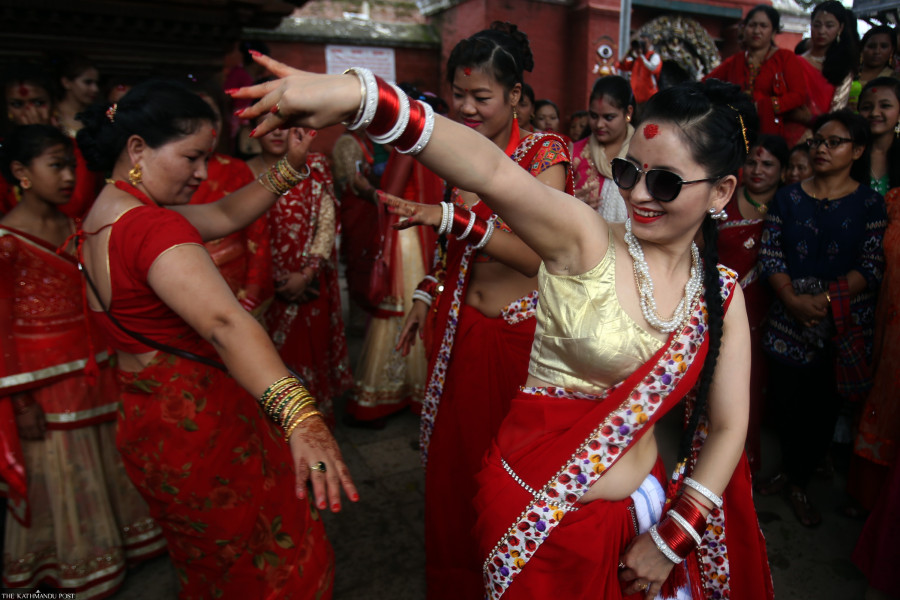National
A viral dance step ruffles feathers among Nepalis, mostly men, on social media
A group of Nepali women upload a video enacting a viral dance move. Moral police online accuse them of stepping out of line.
Aakriti Ghimire
On Tuesday, a Tiktok user, @priyanka_oli, uploaded a video clip featuring a group of six young Nepali women, clad in their work attire, dancing to the beats of a catchy, upbeat Bollywood song called ‘Kala Chasma’ from the 2016 Katrina Kaif-starrer film ‘Baar Baar Dekho’.
The video, now deleted, was not your normal Tiktok clip. It featured a dance step that many found provocative. It quickly went viral and has raised quite some feathers among Nepalis on the internet.
First posted on Tiktok, the video quickly made it to other social media platforms. On Facebook, it has been viewed over 853,000 times as of Saturday evening.
The video features six women wearing a sky blue kurta, and a purple suruwal and shawl. As for the woman performing the dance step in question, she also wears a kala chasma, or black shades.
One of the women in the video can be seen dancing and twerking—laying on all fours and thrusting their hips upwards and downwards.
If they were buoyed by the viral quality of the video, two days later the women, who are health workers in Babai Rural Municipality, Dang, were forced to backtrack on their step.
The user, @priyanka_oli, deleted the video in question and uploaded another video apologising to the audience for “overstepping the line demarcated by society” and promising to “stay within the dignity of our roles.”
The apology, however, did not come out of the will of the health workers. It followed a lot of character assassination and abuses hurled at them, directly and indirectly.
A, a woman who was on the dance video, said that the women were at the receiving end of many derogatory comments. Most of the comments ran along the lines of “You should take them out of their job. How will such women give any services? Make them apologise,” said A, who spoke to the Post on the condition of anonymity. “We were asked to apologise to show that we have realised our mistakes.”
Like the group of health workers from Dang, many Nepali women have uploaded videos on social networks enacting the same dance step.
Gender experts the Post talked to said none of this has sat well with the “self-proclaimed messiahs of social norms and sanskaar.”
Many of those, mostly men, who consider themselves to be the custodians of morality, have not just resorted to character assassination and religious righteousness, but have also issued public threats to “cancel Teej”, a Hindu festival, in the upcoming years.
Experts say the latest objection is part of the continued efforts to control women’s freedom.
“When women try to celebrate Teej in their own styles, these men want to control women,” said Pallavi Payal, an independent researcher and feminist. “Surely, women can exercise their freedom but there are rules to exercise it. What do they want women to be? A puppet?”
Many critics of such dance steps say that it spreads disorder in society and sends the wrong message to future generations.
The choreography copied and enacted by many Nepali social media users and content creators was first uploaded online by TheQuickStyle, a Norwegian hip-hop/urban dance crew. Their videos on Kala Chashma have amassed millions of views on YouTube, TikTok, Instagram, and other social networking platforms.
However, the instance women uploaded their dances on TheQuickStyle’s choreography, many have even labelled the dance moves as those that are best fit for bars and anti-national, according to experts and social media users.
It isn’t just the health workers who were consistently trolled by the ‘moral police’ on the internet.
After uploading her video enacting the choreography with the hashtag #teejspecial, the popular model and actress Aliza Gautam was also trolled online.
Gautam’s videos copying TheQuickStyle’s choreography, albeit available online on her accounts, are no longer available for the public to comment on, as opposed to her other posts. This is an example of how people online try to police women.
Uploading a compilation video of various such dances performed by women as a celebration of Teej, a Facebook user writes, “When an act is not performed at the right time, the right way, and right place, it will backfire. That, when it comes to festivals and culture, will have a bad effect on future generations and wrong things will be perpetuated. Please do not spread aberration in society. In view of the activity of the past few years, there might come a time in the next few years when we have to stop celebrating this festival called Teej.”
Gender experts, however, say it’s an excuse made by those who call themselves the vanguards of social order to ensure their control over women. In addition, moral policing is further magnified during festivals, when women are told how they should celebrate and are criticised when they don’t conform. According to them, women’s dancing has become a threat to society.
“They have objections to women dancing and they have a problem with the hook step,” Payal said. “Had it been a sad, melancholic Teej song praising men, I doubt they would have any problem with it.”
Payal further added, “Women dancing has hurt men’s sentiments. Who has given these men the right to determine what is socially acceptable and what is not?”
Not just gender experts but also health workers find society’s outlook on this dance hypocritical. Reflecting on their days of service during the time when the Covid pandemic was at its peak, health workers wonder how dancing then made them more competent at their jobs but this dance makes them incompetent.
“When we danced during Covid times, they encouraged us,” A, the health worker, said. “They said—wow, look at them taking such good care of their patients. Today, when we are having fun, they question our ability to do our jobs?”
A asked, “Is there any official rule about what is a dignified dance and what is not?”




 8.79°C Kathmandu
8.79°C Kathmandu















